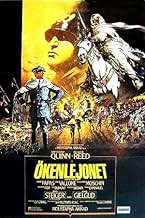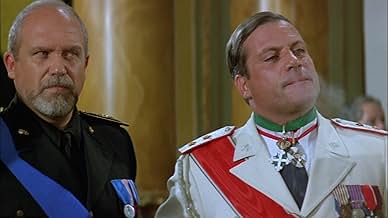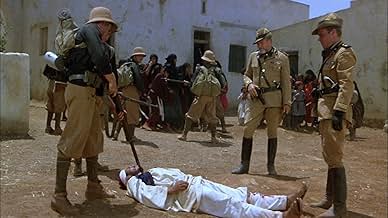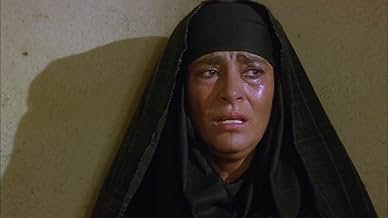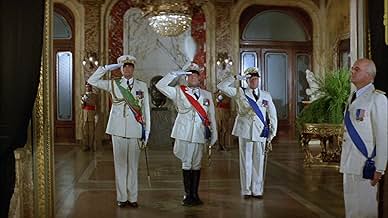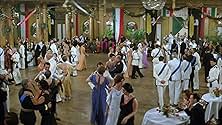Füge eine Handlung in deiner Sprache hinzuIn 1929, Italian Fascist dictator Benito Mussolini appoints General Rodolfo Graziani as colonial governor to Italian Libya with orders to stamp-out all resistance from Libyan nationalists le... Alles lesenIn 1929, Italian Fascist dictator Benito Mussolini appoints General Rodolfo Graziani as colonial governor to Italian Libya with orders to stamp-out all resistance from Libyan nationalists led by rebel guerrilla leader Omar Mukhtar.In 1929, Italian Fascist dictator Benito Mussolini appoints General Rodolfo Graziani as colonial governor to Italian Libya with orders to stamp-out all resistance from Libyan nationalists led by rebel guerrilla leader Omar Mukhtar.
- Regie
- Drehbuch
- Hauptbesetzung
- Prince Amadeo
- (as Sky Dumont)
Empfohlene Bewertungen
Almost all aspects of movie making are amazingly rendered. It will easily compare with any movie about war and politics. The savagery, otherwise recorded only in books, is depicted marvelously. I want to praise a couple of actors but it would not be correct to leave anyone out so I am just saying that they were all tailor made for their roles. There is some real reel footage in the movie and that drives home the points raised in this movie.
On a tangent it is interesting that the so called civilized countries continuously plumbed new depths of uncivilized actions only for land and riches . It is an amazing display of imperialistic debauchery.
The Arab-American Moustapha Akkad produced and directed the film in Libya with Gaddafi's full support. The film is reasonably accurate and, in my opinion, fair and balanced. Anthony Quinn had a long and distinguished career playing 'ethnic types' and his portrayal of Omar Mukhtar is undoubtedly one of his finest performances. Omar in the film is probably much more of an action man than the real Mukhtar who was more of a strategist than a fighter. Or so I was informed whilst on holiday in Tunisia. The film is (understandably) one of the most famous in the Arab world, dealing as it does with Arab suffering under recent European colonialism.
Akkad uses original black and white archive film to underpin its historical authenticity. At the start to set the scene of the Italian conquest of Libya from Turkey in 1911. In the middle to show an aerial view of the concentration camps built by the Italians and also the barbed wire 'Hadrian's Wall' built along the Egyptian border. Both these strategies were intended to cut off Mukhtar from his supply sources. At the end of the film there are still photos of the real Mukhtar in chains and also of the main Italian protagonists we see in the film.
Rod Steiger blusters through his role as Mussolini, the fascist dictator who wants to send Italian colonists to a peaceful Libya, an ambition being thwarted by Omar Mukhtar's stubborn 20-year long armed resistance. Oliver Reed plays a suitably ruthless General Graziani, the man charged with crushing Mukhtar. But his character is no two-dimensional brute.There is a very engaging private dialogue between himself and the captive Mukhtar. The two men debate historic claims to Libyan soil, with Graziani pointing out that the Romans were there before the Arabs. Reed gives a very controlled performance, one of his best.
The film is very balanced in its portrayal of the Italians. On the one hand we see some terrible reprisals-shootings and hangings-against civilians. On the other hand we have two sympathetic Italian officers whose conscience is afflicted by by the war they are forced to wage. The Raf Vallone character is particularly sympathetic- very courteous, generous and kind to the captive Mukhtar. This is history telling at its best. Italian fascists were not all the same. Individuals matter. Likewise, the Italian officer chosen to defend Omar at his trial argues that Mukhtar never committed treason against the Italian state because he never accepted it rule.
On the Arab side we have John Gielgud playing the high-ranking Sharif el-Gariani character who is sent to ask Omar to end his struggle. Some Arabs were willing to collaborate with an Italian rule which was helping to modernise their country. There is a nice reference to the fact that 'the League of Nations will not help you', highlighting the limitations of this predecessor of the UN. Come to think of it, things have not changed very much!
The action scenes are spectacular, with some inspiring ambushes by the insurgents against the Italian forces. The film credits Graziani (wrongly?) with being the first general to bring tanks into the desert. The Italian assault on the oasis town of Kufra is a theatrical masterpiece. Some viewers may think that all this is probably a bit over the top. It probably is but it certainly boosts the film's entertainment level. In fact, the film could have shown Italian planes dropping poison gas bombs as they did in Abyssinia a few years later. In his biography of Mussolini, the eminent historian Denis Mack Smith maintains that this did happen in Libya.
The music is very effective and the film is emotionally charged throughout, especially during the hanging scenes. The Omar Mukhtar character is accorded a great deal of dignity and honour. The film is hagiography but so are 'Spartacus', 'Ben-Hur', 'El Cid' and scores of other epics. Does this make the film a piece of Arab propaganda? Yes and no. The film emphasises the central role of Islam in giving Omar the inner strength to continue his fight. It tells an historical tale with a great deal of accuracy but it is also a feature film which aims to entertain. In that respect it is no different to any Hollywood blockbuster about the Alamo or Pearl Harbor. In my opinion it is superior to many such blockbusters. It's just that white Caucasians have to get used to being the bad guys for a change.
Gaddafi is now coming in from the cold and opening up his country to tourism. I can only hope that this will result in the film becoming more widely available and better-known in the UK. 'Lion of the Desert' is an excellent historical epic which tells one side of the story. Some historians would argue that Mukhtar's defeat and death paved the way for the enlightened rule of Italo Balbo who governed a 'pacified' Libya after 1934 with few executions and much building of infrastructure. I would not accept this view as all imperialisms are self-justifying and ultimately unacceptable.
Not quite.
The film is no more anti-Italian than it is pro-Islam. That is to say it is neither. It's a grand scale film that shows a Facist state's attempt to colonize and reign over north Africa in the early half of the 20th century, and how the native populace waged a guerilla war against this effort. It does not cast aspersions on Italians, nor pushes Islam as a religion. Italy happens to be swept up in a facist mindset whose forces are at odds with a people who are predominantly Muslim.
Anthony Quinn himself states in the "Making of..." documentary that the lead character, Omar al-Mukhtar, was not fighting for Islam, nor proselytizing in any way. He was one of many guerilla leaders who was trying to push the facists out of Libya. And even then he's only trying to regain that which was taken by facists, and not so much force Italians themselves to leave. Facists who, at the time, happened to be from Italy. From what I've seen the film does its best to accurately depict what went on during Italy's expansionist period under Mussolini, and shows this episode of political and military contention between the two sides in Libya.
There's lots of good acting here, and grand battle scenes. The cinematography is the usual style for this sort of film. Unfortunately the cast was chosen more for their names to sell the film than anything else. Even so they, Quin, Reed, Steiger and the rest do a pretty good job of showing us how the men of the time acted and behaved, and Quinn does en exceptional job of showing a humble but resolved Mukhtar. The battle scenes, for the most part, are pretty good. There's one or two hammy performances by a couple of the supporting cast members, but they're overshadowed by the rest of the film.
The DVD transfer is OK. Anchor Bay's gone to some extra lengths to put some extra goodies on the disk, but the film's image could've used a dual layer process.
If you're a fan of military epics this film should entertain. A good watch.
This movie truly shows the the savage means which the conquering Italian army used to treat the Libyan natives. The struggle for freedom took place in the heart of the African desert. Omar Al Mukhtar (The Lion of the Desert), who led the Libyan resistance, a role played in this movie by Anthony Quinn ... this has to be his best ever performance. An Oscar Nominee worth ... nothing less. Director, Moustapha Akkad, who is also famous for the great yet unknown classic Risâlah, al- (1976), gives his best shot at direction here. Excellent work.
Rent this now, if its available, Its worth every penny. You will be the witness of utter brilliance and great performances. Watch it, vote for it, Give it the respect it deserves.
Wusstest du schon
- WissenswertesThe production's obsession with authenticity extended right down to the same barber who used to shave Benito Mussolini's head being hired to shave Rod Steiger's, the actor who played him.
- PatzerMussolini is talking to Graziani in the opening when he looks the map of Libya, and says that all the green land is for Italy, but this is a topographical map that shows land greener as it becomes lower by sea level. Ninety percent of the area of Libya is desert.
- Zitate
Omar Mukhtar: We will never surrender. We win or we die. And don't think it stops there. You will have the next generation to fight; and after the next, the next. As for me, I will live longer than my hangman.
- Alternative VersionenThe U.S.A. Home Video VHS release in the '80s runs 160 minutes. Footage has been added in the Director's Cut released on Anchor Bay Video. This version, released in 1998, runs 206 minutes.
Top-Auswahl
- How long is Lion of the Desert?Powered by Alexa
Details
Box Office
- Budget
- 35.000.000 $ (geschätzt)
- Laufzeit2 Stunden 53 Minuten
- Farbe
- Sound-Mix
- Seitenverhältnis
- 2.35 : 1


